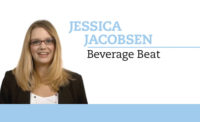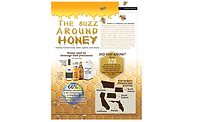Beverage Beat
Honey offers beverage alcohol new opportunities
Spirits, meads take advantage of honey’s attributes in new product development

Nectar Creek Meadery introduced its premium line of barrel-aged meads with the launch of Super Cyser and Super Mure.
Image courtesy of 2 Towns Ciderhouse
At a recent family visit to our local county fair, the beekeeper association had a booth sharing information about honeybees, good beekeeping practices and much more. The women also were handing out honey stick samples, which were a big hit with all of the booth visitors. Although the association was helping to spread the word about amateur beekeeping and honeybees, this visit got me thinking about the contributions honey has made to the alcohol industry.
Catherine Barry, vice president of marketing at National Honey Board, Erie, Colo., highlights that honey has a rich history in the whiskey market, but that its adoption has taken on new heights as distillers realized the opportunities available when working with honey.
“We’ve come a long way since the founder of Wild Turkey, Jimmy Russell, first added honey to Wild Turkey 101 Bourbon in 1976,” she says. “Back then, it was a novelty. Today, honey whiskey is one of the largest categories in the flavored whiskey segment. However, it’s not just whiskey that is benefiting from honey’s use. Distillers around the world are using honey to create dynamic gins, vodkas, liqueurs and even tequilas.”
Barry explains that honey’s perception by consumers as a natural and healthy sweetener makes it popular with health-conscious consumers. This also aligns with its clean label perception.
“Consumers are looking for products with clean labels, meaning fewer artificial additives and recognizable ingredients,” she explains. “Honey fits well into this trend, as it is a single, natural ingredient that can simplify product labels.”
Additionally, Barry touts honey’s sustainability and functionality properties.
Perhaps just as intriguing as these benefits though are the flavor optionality it can offer.
“Honey has a unique flavor profile thanks to 300 varietals in the U.S. that can enhance a wide range of spirits; its versatility allows brands to experiment and create innovative flavors,” Barry says. “In general, darker, more robust honeys go with darker spirits, and delicate, lighter honeys match clear spirits.”
These all can come into play in brands that are looking to stand out in the market.
“Using honey can help brands differentiate their products in a crowded market,” Barry says. “The unique benefits and appeal of honey can be a key selling point that sets a product apart from competitors.”
Adding to spirits market later this year, Amber & Opal Spirits will release its flagship premium honey botanical whiskey. The Maryland Straight Rye Whiskey is aged two years in medium-charred, American oak barrels with a flavor profile featuring the richness of all-natural honey, smoky black tea and wild botanicals with finishing notes of cinnamon, ginger and fig, the company says.

Image courtesy of Amber & Opal Spirits
Yet, spirits isn’t the only beverage alcohol seeing positive contributions from honey. Polaris Market Research released its “Honey Wine Market” report, which estimates that the global market could reach a value more than $1 billion by 2032. The report notes that the global meads, or honey wine market, is dominated by Europe with the U.K., Italy and France as major contributors. It also predicts that the Asia-Pacific region will see significant growth.
Yet, experts note that the history of meads runs deep and the craft nature of market could play a role in this category expanding in the United States.
“Mead — a honey wine — is believed to be the oldest alcoholic beverage ever produced and has been gaining in popularity as consumers seek alternatives to beer and spirits,” Barry says. “Storytelling can be a huge part of the marketing aspect of mead, with its rich historical appeal, which can be leveraged to attract consumers interested in unique and storied products.
“The National Honey Board’s 2024 Mead Crafters Competition recognizes 10 different categories of mead, thanks in part to mead’s unique quality as an artisanal product,” she continues. “Mead offers a wide range of flavor possibilities and blends with fruits, spices and herbs. Consumers are seeking out unique and locally-produced, craft beverages, and the versatility in flavor alone allows meaderies to cater to diverse taste preferences.”
Adding to the mead market earlier this year, Nectar Creek Meadery, a sister brand of 2 Towns Ciderhouse, introduced its premium line of barrel-aged meads with the launch of Super Cyser and Super Mure.
Phil Lorenz, co-founder and brand manager of Nectar Creek explained at the time of the launch: “These premium barrel aged meads reflect our commitment to age-old craftsmanship with a modern twist. With ingredients sourced from the Pacific Northwest, Super Mure and Super Cyser, deliver a rich and nuanced flavor experience that is truly exceptional.”
The meads also were recognized at the recent Oregon Wine Awards where Super Mure earned 92 points, while Super Cyser was awarded 91 points, both earning a Gold Medal.
As cliché as it might sound, honey is offering beverage alcohol sweet opportunities.
Looking for a reprint of this article?
From high-res PDFs to custom plaques, order your copy today!









